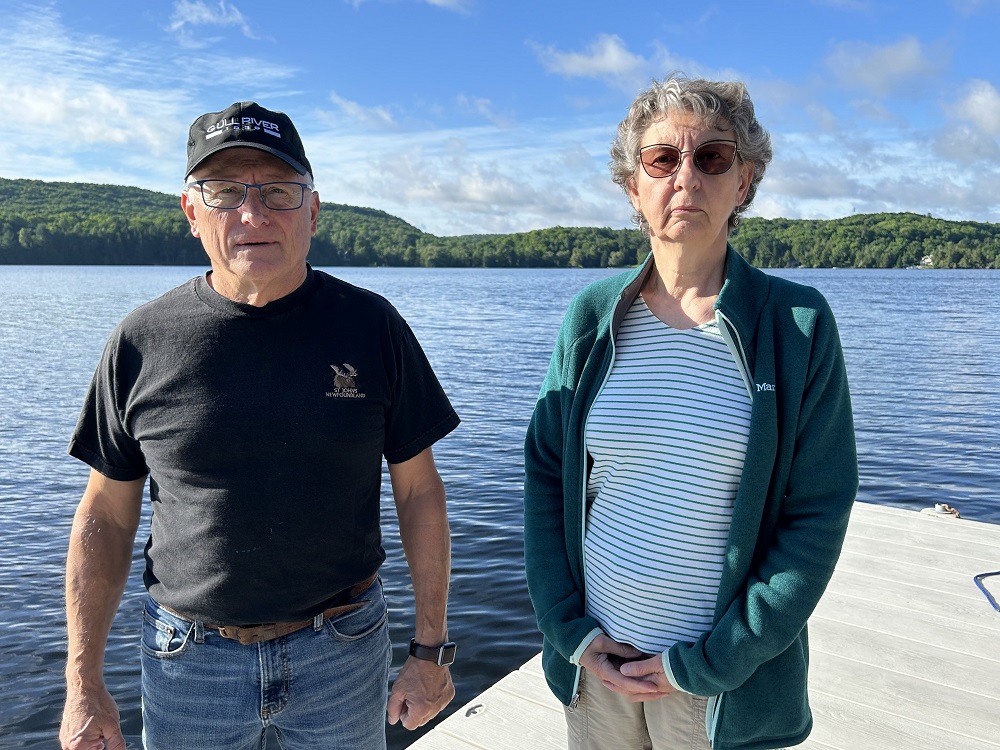Lake Kashagawigamog resident Lance Payne is fed up with not being able to safely access the water from his private dock during daytime hours throughout the summer.
He was one of four delegates pleading with Dysart et al council June 25 to implement rules limiting the impact of boat wakes on the Lake Kash chain. He was joined by Lake Kashagawigamog Organization president Wendy Hampson, Dr. Timothy James, and Silver Beach resident Dave Tranter, who said they’ve been dealing with the issue for two years.
It started, they say, when Haliburton Hockey Haven, a local youth camp, started offering wakeboarding on Lake Kash in 2022.
“They run two wake boats continuously for six hours daily, from 9 a.m. to 4 p.m. (breaking for lunch) every weekday in July and August. This is not allowing property owners to engage in safe water-related activities in a fair or equitable manner,” Payne said. “We also have concerns about ecological damage in the future.”
Payne said the boats regularly send waves up to three-feet high careening towards the shore. “It’s dangerous – people feel like they can’t go swimming, they can’t go out in kayaks or canoes. It’s impossible to sit on the deck without being thrown around,” Payne added. “The objective is not to remove wake boats from this lake, it’s to look at a more equitable use in sharing the water.”
Councillors confident about compromise
Tranter said the Silver Beach community is up in arms, too. He estimates their association has spent approximately $50,000 repairing docks and other equipment by the water due to excessive wakes over the past two years.
He said this was about more than money, however.
“It’s not safe down by the water when these boats are running – one of our residents fell between their dock and boat last year after a wake,” Tranter said. “I want council’s support to come up with a reasonable solution to this, because it has to stop.”
Hampson said LKO administration met with Troy Binnie, who owns Haliburton Hockey Haven, June 4 to see if they could work out any issues. She said they spent two years trying to organize a meeting, and while she was thankful for the opportunity to connect, the two parties left without an arrangement.
Binnie said he was unaware the issue was before council, telling The Highlander, “I realize there are a lot of wakeboard boats or similar in the 22-mile chain of lakes we are on, but I do know our drivers have been trained to respect and protect our lake and our campers, with safety being our top priority.”
He added that all Hockey Haven boats are equipped with front and rear dash cams to ensure the training and safety of campers is “constantly recorded and reviewed so we can make sure our staff are following the federal boating guidelines, as well as those around us.”
James, a scientist who works in ecological conservation, said as dangerous as these wakes are for people, they’re worse for the environment.
“Without question, there’s evidence to support citizen observations of shoreline damage, changes to lake ecology and water quality… a new and significant physical stressor [has been added] to our lake system. When you add a new stressor like this, the system responds. It’s this response that’s the cause of concern,” James said.
He noted the County’s lakes are “pristine” but due to the delicate balance of nutrients in the water, he’s afraid the wakes could skew things and lead to the formation of algae and growth of weeds in the water.
“Unfortunately, one of the best ways to introduce unwanted nutrients like phosphorous into the water is by eroding our shorelines and stirring up underwater sediments… this can happen naturally, but the relationship between wake size and its power is exponential. A small increase in wake size means a really big increase in what it can erode,”
James said, noting the waves created by wakeboarding on Lake Kash are up to 17 times stronger than natural waves. James said the wakes are likely impacting fish and other wildlife native to Lake Kash, and the use of larger boats, like those used for wakeboarding, increases the risk of introducing invasive species to the system.
Payne said he’d like to see Dysart connect with Transport Canada to establish Vessel Operation Restriction Regulations (VORR) on Lake Kash. He said the deadline for new applications for summer 2025 is Aug. 15.
Deputy mayor Walt McKechnie said he wasn’t in favour of going that route – yet.
McKechnie said he spoke with Binnie this week, who, he claims, has agreed to a compromise – reducing the sound of music on one boat he’ll maintain on Little Kash, and moving the second boat to Big Kash “a few days of the week.” McKechnie believes the township should focus on educating people rather than jumping straight to enforcement.
“Bringing in VORR is not the right answer… I’d like to see us communicating with all lake associations to let the people know about the respect they should have for our lakes and shorelines,” McKechnie said.
Coun. Nancy Wood-Roberts said she spent time on Lake Kash last summer and said the boats were “very noisy” and the large wakes made it impossible for people to access the water, especially with children.
Ward 1 coun. Pat Casey said the township should work with Hockey Haven to ensure they’re following through with the proposed compromise and see what impact, if any, that has. If the issue remains, council can discuss more stringent measures.
“We’re trying to come up with something that is workable for everyone,” Casey said





